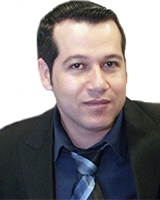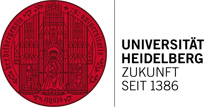“For me, Heidelberg is the perfect place where I want to live”

Dr Wasim Abuillan, Physicist at University of Tokyo in Tokyo/Japan
From 2009 to 2017 Doctoral Candidate and Postdoc at Heidelberg University
When, how long and in what position did you stay at Heidelberg University?
In February 2009, I started my PhD in physics at the institute of physical chemistry within the group of Professor Motomu Tanaka and even after the completion of my PhD in November 2013, I continued as postdoctoral within the same group for another 3 years.
Why did you decide in favour of the Ruperto Carola?
After finishing my master degree from Stuttgart University, I could get more than three PhD offers from different Universities in Germany including Heidelberg. It was not a difficult decision for me to choose Ruperto Carola. First, the University has a high reputation worldwide and second my specialism is biophysics in which Heidelberg is leading in many bio-related research fields.
What have you learned in Heidelberg? What experiences have been particularly valuable?
Most of the things if it not all that I learned as scientist were in Heidelberg. Over there being a biophysicist means interacting and collaborating with many interdisciplinary fields. This is what you learn first how to work in an interdisciplinary environment. Accordingly, I learned to talk the language (i.e scientific language) of a chemist, biologist, medicine etc. that is a crucial point to move successfully forward in research projects. Importantly, I learned to work within a teamwork in which the group members are not only focusing on their work, helping each other and collaborating but also acting as a big family. We organized many social activities, barbecues, “Spieleabend”, after defense parties, Christmas market. This stuff is an important part in the research group, which reflected directly on the work productivity. The most valuable thing I learned in Heidelberg specifically in the group of Professor Tanaka is how to enjoy science not to take as part of career development but as a life joy.
What do you like best about being in Heidelberg? What suggestions would you have for improvements?
Being in Heidelberg means being in a wide international environment from across the world. Here, I got to know many cultural backgrounds, traditions and habits which I probably could not be able to know in such short time within a small city elsewhere. Personally, I like much to live in Heidelberg, despite the small area, it is full of wonder, beauty and I could access everything I wanted. I could not think of more improvements, for me it is the perfect place where I want to live.
How did your career continue after your time in Heidelberg?
It was not hard to carry on in my research career from a leading University in Germany to leading University in Japan, the University of Tokyo. I think without the impact being in Heidelberg it could be tremendously difficult to continue my research in top Universities and get one of the most prestigious fellowships in the world, the Japan Society for the Promotion of Science (JSPS) and the Alexander von Humboldt fellowships.
What is your view of the German scientific system in comparison to that of your home country or to that of other countries where you may have conducted research?
I think the German scientific system if fair from all prospective. I cannot compare it to my origin country ‘Palestine ‘since it is still in its primary phase. In terms of research budget and funding programs, the German system stands among the top in European countries. With its good support for doctoral graduates it puts Germany in the second rank in the world after the US in terms of the number of PhDs. Compared to countries where conducted research I found that the size of research group is small compared to the German ones. For instance, in France the group consists of five PhDs or even less and similarly in Japan where a lot of research group based mainly on master student or undergraduates while in Germany the research groups are in average between 10 and 20 and some are even beyond. This an advantage where teamwork can enhance productivity and facilities exchange of expertise.
In your opinion, what is the importance of international exchanges for researchers?
Now days, the research fields are merging and new field emerges with the gap between vanishes. This surely enhances collaborations among the researchers but it limits creativity and innovation and in order to search for new ideas international exchanges of researches is indispensable.
Do you recommend a research visit to Heidelberg University to your students or to colleagues in your scientific network?
Most of the researcher I met already visited Heidelberg and I always encourage the ones who never been there. For example, I recommended my former mentor in Palestine to visit Heidelberg University. Now I am helping him to do that and I hope to make it happen in the near future. To me Heidelberg is not only a place where I studied but also a message I carry with me wherever I go.

